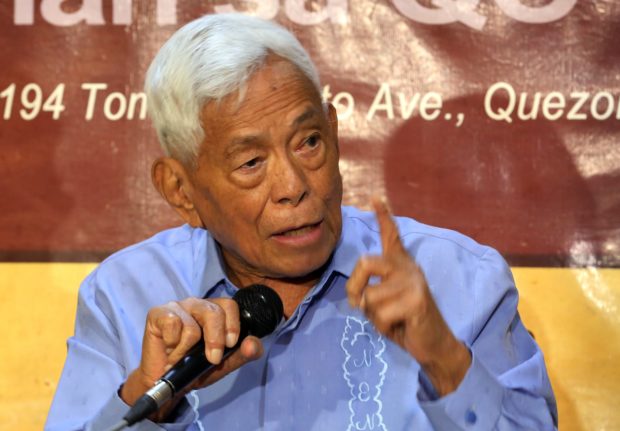
Former Senate President Aquilino “Nene” Pimentel Jr. voted for a ban on political dynasties during the meeting of the Constitutional Committee on Monday, March 12, 2018. The ban was set aside after members of the Con-Com voted 10-9 to just regulate dynasties. INQUIRER FILE / NIÑO JESUS ORBETA
The Consultative Committee (Con-Com) tasked by President Rodrigo Duterte to review the 1987 Constitution decided to recommend regulating political dynasties instead of banning them.
After voting 10-9 to regulate political dynasties, the panel decided to prohibit an incumbent official’s relatives from the first and second degrees of consanguinity and affinity from running for public office.
Included in a person’s first degree of consanguinity, or relationship by blood, are his parents and children, while grandparents, brothers or sisters, and grandchildren are within the second degree.
By affinity, a person’s spouse is first degree, while his or her parent-in-law, daughter or son-in-law are second degree.
De La Salle Dean Julio Teehankee, who chairs the subcommittee on political reforms, said there were currently 295 political dynasties nationwide, most of which were in poor areas.
Teehankee said the main evil to be addressed in political dynasties was the advantage enjoyed by incumbent officials, who are encouraged to perpetuate themselves in power.
He added that political dynasties combined with a weak political party system “lead to weakening of the democratic system.”
Lawyer Roan Libarios aired concern that banning political dynasties might clash with the choice of the people.
Teehankee responded: “We are not banning political families from running for office forever … what we’re saying is give chance to others.”
Aquilino “Nene” Pimentel Jr., who voted for a total ban, said: “We want to stop political dynasties. We have to ban them totally otherwise we’re providing loopholes.”
Retired Chief Justice Reynato Puno, chair of the committee, voted for a regulated ban.
The committee is tasked to recommend changes in the 30-year-old Constitution to Duterte, who would then submit it to Congress. Congress may or may not accept the recommendations. /cbb
READ: ConCom set to resolve issues surrounding political dynasty